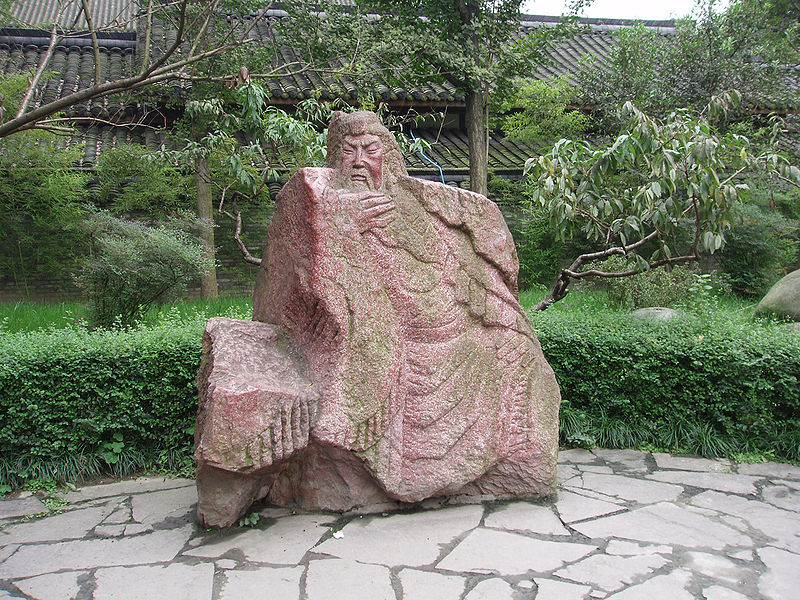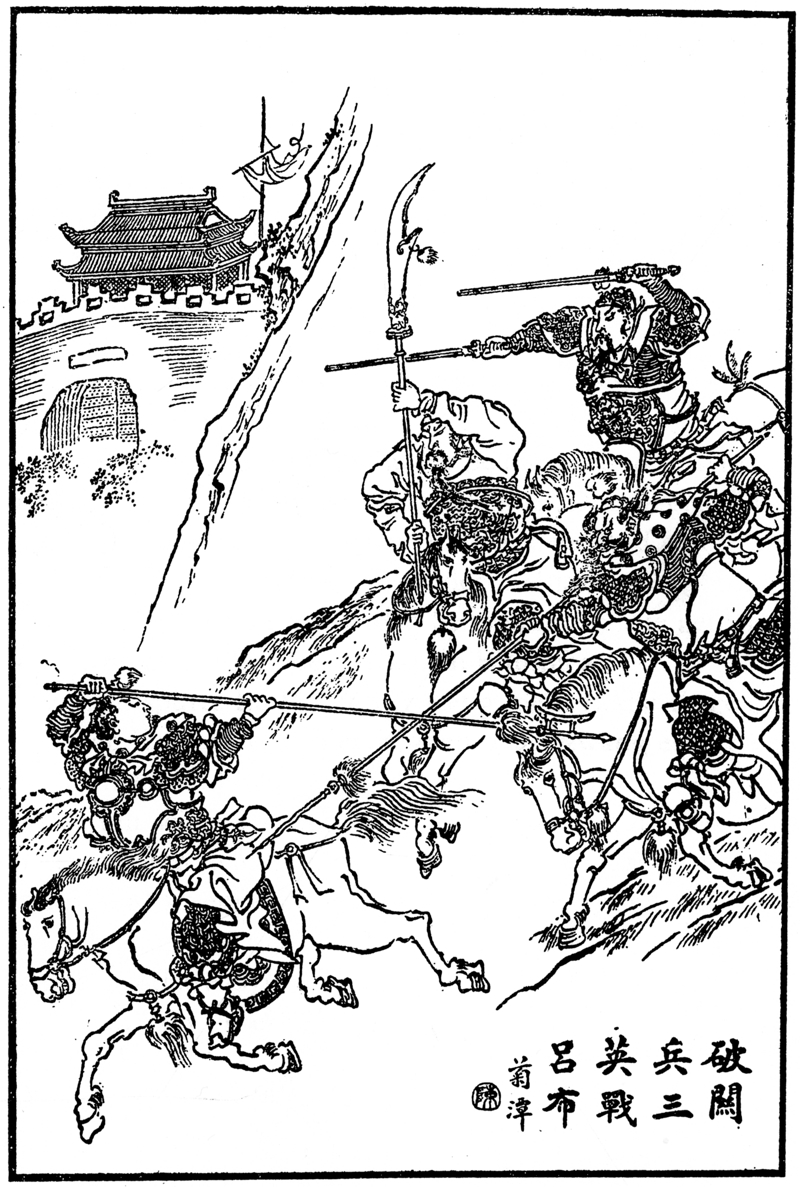Guan Yu Biography: Revered Chinese Warrior

Guan Yu was a Chinese military general whose martial prowess was so great that, after his death, he was deified as a god. In modern times, he is revered for his bravery and loyalty. He has also become a popular figure in historical fiction, movies and video games.
The year of his birth is unknown; he died in A.D. 219 or 220. Guan lived at a time when the Han Dynasty, which had ruled China for nearly 400 years, was collapsing. During his lifetime, a series of events would occur that resulted in the emergence of the “Three Kingdoms” of Wei, Wu and Shu. Guan served a man named Liu Bei, who would eventually become King of Shu.
Guan was a “man of great physical courage and skill, at one occasion (he) had a serious operation on his arm carried during a banquet and even as the blood flowed he ate and drank and laughed as usual,” writes Rafe de Crespigny, a retired professor at the Australian National University, in his book “A Biographical Dictionary of Later Han to the Three Kingdoms (23-220 AD)” (Brill, 2007).
Little is known of his early life. His style name (also called courtesy name) was originally “Changsheng” but it was later changed to “Yunchang.” He was registered as being from Hedong Commandery (also called a prefecture, or administrative region). At some point in the late second century, he fled to Zhou Commandery in fear of his life and joined up with Liu Bei. Eventually Guan, Liu Bei and another man named Zhang Fei would become brothers of sorts, with a deep sense of loyalty to each other, one that would become legend.
Capture by Cao Cao
Liu Bei’s early military ventures did not go well. In A.D. 200, Guan was captured by Cao Cao, a military general who would go on to control a vast amount of territory in northern China. His lands would eventually form the Kingdom of Wei.
Cao Cao treated Guan well and made him a lieutenant general in his own army. Still, Guan regarded Liu Bei and Zhang Fei as brothers and he would not abandon them.
According to the 11th-century Chinese historian Ssu-ma Kuang, Guan decided that he had to escape and rejoin Liu, but not before doing Cao Cao a favor first. “I know well how generously Lord (Cao Cao) has treated me, but I have received favors from General (Liu Bei) and I swore to die with him. In the end I must go.” (Translation by Rafe de Crespigny, published in 1969)
To repay Cao Cao for the good way he had treated him Guan decided to kill a general named Yan Liang, who served a man named Yuan Shao (a rival of Cao Cao).
“Yu saw Liang’s standard in the distance. He whipped his horse and broke through to Liang among ten thousand men of his army. He cut off Liang’s head and came back and no one in Shao’s army could resist him,” wrote Ssu-ma Kuang.
After the battle, he fled Cao Cao’s army to rejoin Liu Bei. Cao Cao was said to have been so impressed by his loyalty and martial prowess that he ordered his troops to let Guan go.
Battle of Red Cliffs
Over the next two decades Guan, would work with Liu Bei in a series of military campaigns that would eventually lead to the foundation of the Kingdom of Shu.
Records indicate that he excelled at naval warfare. In A.D. 208, after the death of general Liu Biao, he took command of a fleet of ships on the Han River and brought them to Red Cliffs. During this battle, Cao Cao’s army, pressing south, tried to re-unify China by destroying the forces of Liu Bei and Sun Quan, who had formed an alliance. The battle was a disaster for Cao Cao and he suffered a defeat that allowed the three kingdoms to come into existence.
As Liu Bei consolidated his position, becoming the King of Shu, Guan was promoted to the position of “General of the Van,” something that he was unhappy about because he had the same rank as a man named Huang Chung whom he disliked.
“I’m better than that dunderhead!” Guan is said to have thundered when he heard that he would have the same rank as Huang (eventually Guan agreed to accept the arrangement).

The final campaign
Around A.D. 219, Guan led an army of Liu Bei’s in attacking Fancheng, a city held by Cao Cao. Laying siege, he was concerned that the forces of Sun Quan would betray and attack him (the alliance between Liu Bei and Sun had grown cold since the Battle of Red Cliffs).
His fear was not unfounded. The Chinese historian Ssu-ma Kuang writes that Sun’s general Lu Meng started plotting against him. “Yu is brave and fierce, so it is difficult to match him. He already holds (Jing) province and he governs with great favor and loyalty,” Meng said according to the historian.
Ssu-ma Kuang wrote that Guan aggravated the situation by seizing Sun Quan’s food stores without permission to support the siege of Fancheng. Sun plotted against Guan. He replaced the local general, Lu Meng, with a man whom Guan thought would pose no threat. This led Guan to withdraw troops from his rear guard to support the siege. Sun also sent a letter to Cao Cao offering to launch a joint attack against Guan.
Cao Cao decided to publish Sun Quan’s letter, hoping that Guan would abandon the siege of Fancheng to fight Sun (Cao Cao wanted to have his enemies fight against each other). Guan thought the letter was fake and kept up his siege. Meanwhile, Lu attacked Guan’s weak rearguard positions, taking them out before a message could be sent to Guan.
While his rearguard positions were under attack, Guan’s siege of Fancheng faltered. A counter-attack by Cao Cao’s forces forced Guan to break it off. Guan suddenly found himself commanding a weakened force trapped between two enemy armies, those of Cao Cao and Sun Quan.
Battle of Jiangling
Lu Meng, Sun Quan’s general, made Guan’s situation worse by capturing the city of Jiangling, which housed the families of many of Guan’s officers. Lu Meng treated them very well and made sure that Guan’s army knew it.
“All knew that their families had come to no harm and were even treated better than in peacetime so Yu’s soldiers became less interested in fighting,” wrote Ssu-ma Kuang. This led to desertions, shrinking Guan’s forces even further.
Still Guan refused offers to surrender, at one point pretending to surrender to Sun Quan’s troops before running away. Eventually, his remaining force was trapped and Guan Yu and his son Guan Ping were captured and executed.
Becoming a god
After his death, Guan Yu became a legend and eventually a god. Hundreds of years later, when a dynasty called the Tang came to power in China, Guan was honored for his “righteous loyalty” to his lord Liu Bei, writes Whalen Lai, a professor emeritus of religious studies at the University of California Davis, in the “Encyclopaedia of Asian Philosophy” (Routledge, 2001).
During the 10th century, when China was again divided into warring kingdoms, his cult grew. His “personal loyalty to a lord was a premium virtue,” Lai writes. In the 14th century, a novel called “Romance of the Three Kingdoms” publicized the exploits of Guan Yu, further increasing his popularity.
At some point, he became a god of war and is revered today as a symbol of loyalty, righteousness and bravery. He is referred to as Guan Gong (Lord Guan) or Guan Di (Emperor Guan). His “image appears in many Taoist shrines of the present day,” writes de Crespigny. He is also a revered figure in Buddhism, Confucianism and Chinese folk religion. In 2008 and 2009 a movie dramatizing the Battle of Red Cliffs was released in two parts and featured actor Batdorj-in Baasanjab as Guan Yu.
In Japan and the West, he has also become a popular figure in a series of video games produced by the company Koei. These video games emphasize his abilities as a general and martial artist.
Sign up for the Live Science daily newsletter now
Get the world’s most fascinating discoveries delivered straight to your inbox.

Owen Jarus is a regular contributor to Live Science who writes about archaeology and humans' past. He has also written for The Independent (UK), The Canadian Press (CP) and The Associated Press (AP), among others. Owen has a bachelor of arts degree from the University of Toronto and a journalism degree from Ryerson University.










